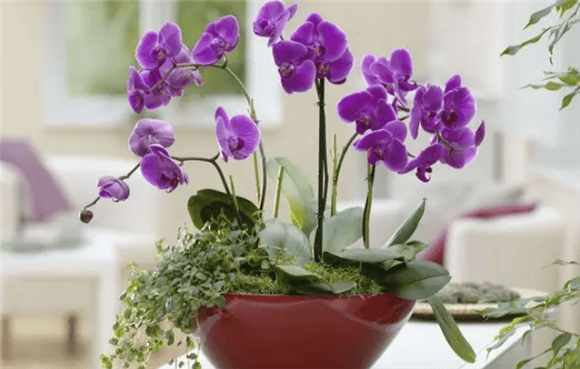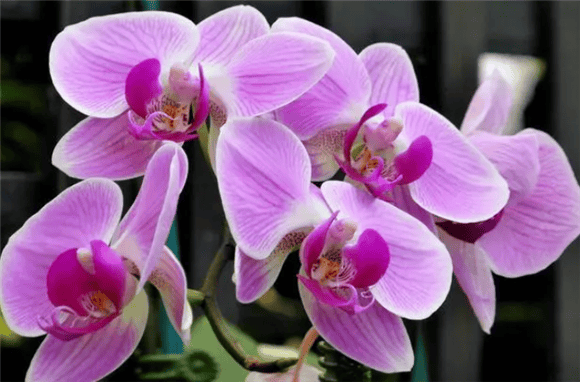Every spring and autumn, there are many Phalaenopsis orchids in the trash can. Some people who don't like flowers will throw them away in the spring because their flowering period has passed.
Another reason is that the Phalaenopsis ran into some trouble while taking care of it and felt that it could no longer survive, so he threw it away.
Phalaenopsis is an epiphytic plant that has certain requirements for its growing environment. General planting and maintenance methods cannot guarantee its survival.
For example, culture media usually uses formulas such as sphagnum moss, bark, charcoal, and ceramsite. Therefore, if you want to raise Phalaenopsis well, you must first know the characteristics and growth environment of Phalaenopsis, and then you can carry out targeted maintenance.
 < /p>
< /p>
1. Phalaenopsis maintenance methods
1. Selection of plant materials
As mentioned before, the raw materials of Phalaenopsis are made of moss, bark, It is a mixture of charcoal, stone, red jade, slow-release fertilizer, etc.
In addition, some other materials can be added according to the water absorption and water retention of the plant material.
Generally, if you grow at home, you can buy some ready-made plant materials from the market, which are cheap and can be used many times.
Because plant material will rot, it will need to be replaced every one to two years.
2. Appropriate watering
Spring and summer are the seasons when Phalaenopsis orchids grow vigorously. At this time, you should pay attention to watering, basically ensuring that it is dry and wet. In summer, it is necessary to Pay attention to maintaining the surrounding air humidity.
Keep the entire plant in a humid environment so that it can grow more vigorously.
In autumn and winter, the temperature will drop, and the amount of watering should be determined according to the specific situation. Keep the pot soil moist but not wet.
3. The lighting should be appropriate
Phalaenopsis cannot be grown on the balcony. It can be placed in a place with better light, such as the living room.
It is best to move it to the living room, bedroom and other places for maintenance.
4. Good ventilation
When raising Phalaenopsis indoors, you must pay attention to ventilation to promote air flow and avoid stuffy heat. Therefore, open more windows for ventilation.
< p>Especially after watering, the excess water in the plant material can evaporate quickly and will not stay in the plant material for a long time.The frequency of watering in summer is relatively high, so there must be a Good ventilation conditions can ensure that water accumulation does not occur.
5. Control the temperature well
Phalaenopsis is a subtropical plant and has certain resistance to high temperatures, but it also has certain resistance to cold.
In the north, the growing environment of Phalaenopsis is very good, but in the south, it is a bit difficult.
The optimal growth temperature of Phalaenopsis is 20-28 degrees Celsius, and the indoor temperature in summer cannot be higher than this temperature.
Therefore, there is no big problem in raising it in summer. The most important thing is that in winter, Phalaenopsis will get sick if the temperature is below 15 degrees Celsius.
6. Fertilize rationally
In the first few months of transplantation, the nutrients in the nutrient solution of Phalaenopsis are sufficient, so there is no need for additional fertilizer. If not, you can add it every Give the Phalaenopsis fertilizer every ten days to help it grow faster.
When the plant growth is slow, less or no fertilizer can be applied. Before flowering, stop using nitrogen and use potassium dihydrogen phosphate to promote flowering.
Watering with potassium dihydrogen phosphate water once every ten days and spraying three times continuously will have a great effect on improving the quality and yield of flowers.
 < /p>
< /p>
2. Phalaenopsis propagation method
1. Stem node propagation
After the Phalaenopsis matures, you can use sterilized tools to remove the rhizome part of the Phalaenopsis. Come down and put them in the container. After a while, they will take root and sprout.
Then transplant them to the new Phalaenopsis, and new spores will grow on the original wounds. come out.
2. Pedicel germination
After the Phalaenopsis blooms, there will be buds on the flower stem. Peel off the surrounding cell shells and use a cotton swab to dip a little germination liquid. After about two weeks, , new leaves will grow.
After three months, its roots and leaves will grow well, and you can pick them at that time.
3. Things to note about Phalaenopsis
1. Flowering period of Phalaenopsis
The natural flowering period of Phalaenopsis is from March to May. There are many kinds of Phalaenopsis on the market. Phalaenopsis orchids bloom in early January. They are artificially induced and can be purchased and raised.
There are also some Phalaenopsis orchids that have not yet bloomed. Due to changes in external conditions, they are unable to bloom. Don't worry, you just need to cultivate them in the original way.
2. Pruning after flowering
After the Phalaenopsis orchid blooms, it is necessary to prune the remaining flowers. For commercial orchids purchased from the market, it is best to prune them after they bloom. Repot the pot, replace the soil, and repot it with self-prepared or purchased plant materials.
Before potting, trim away withered and rotten roots. There will naturally be no problems with subsequent maintenance.
3. Pest and disease control
Phalaenopsis is generally free from pests and diseases, but if it is exposed to poor ventilation, high temperature and high humidity for a long time, soft rot may occur. , brown spot disease and other diseases,
Once this happens, it must be dealt with in time, and the most important thing is to maintain a good breeding environment. Be sure to pay attention to ventilation to avoid high temperature, cold and other conditions.
Overview:
The above is an introduction to Phalaenopsis. I wish all those who raise Phalaenopsis can grow vigorously and bloom one flower after another. If you have any questions, you can send me a private message and we can discuss it together. Thank you!

 扫一扫微信交流
扫一扫微信交流
发布评论